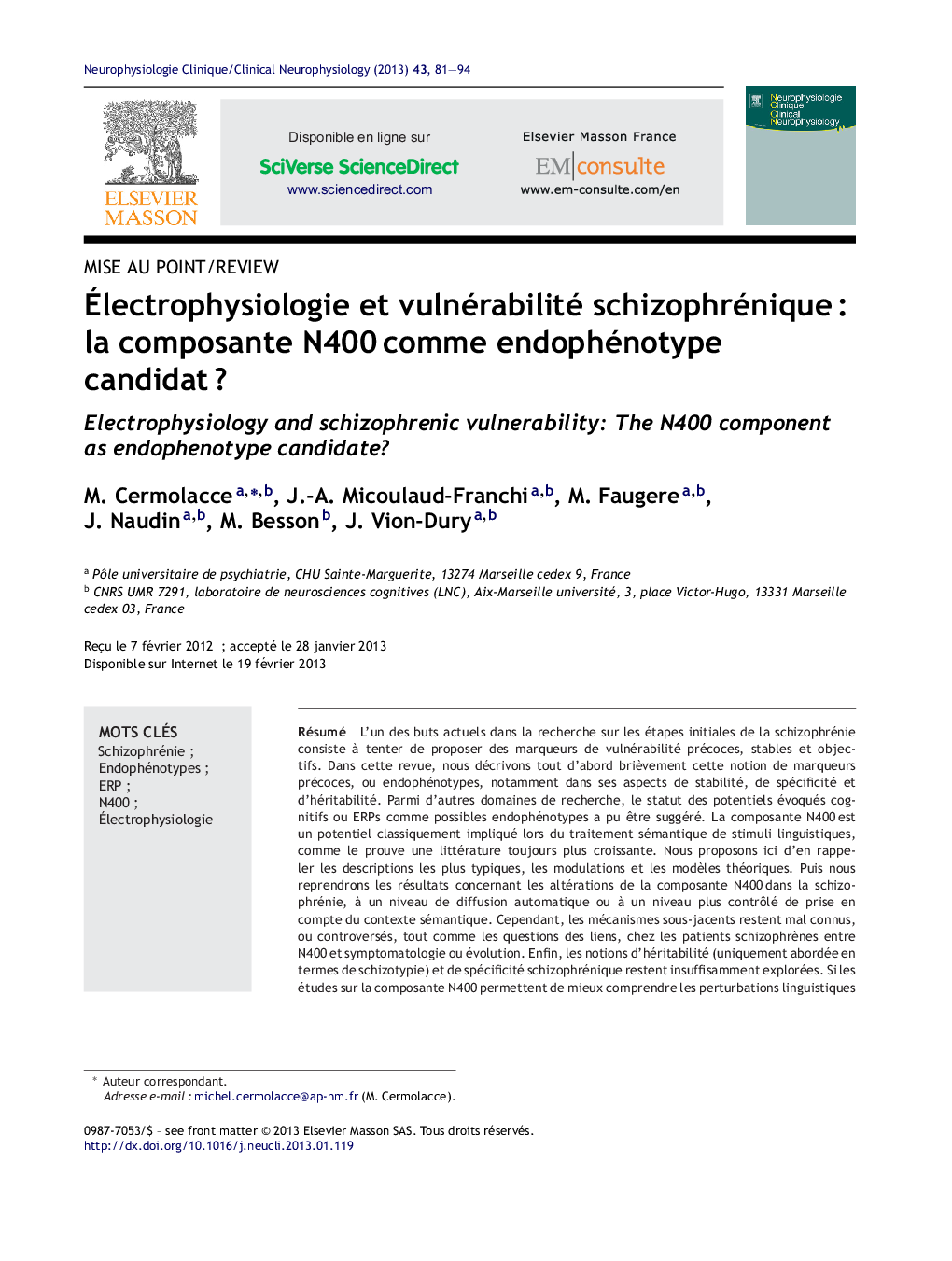| Article ID | Journal | Published Year | Pages | File Type |
|---|---|---|---|---|
| 3082458 | Neurophysiologie Clinique/Clinical Neurophysiology | 2013 | 14 Pages |
RésuméL’un des buts actuels dans la recherche sur les étapes initiales de la schizophrénie consiste à tenter de proposer des marqueurs de vulnérabilité précoces, stables et objectifs. Dans cette revue, nous décrivons tout d’abord brièvement cette notion de marqueurs précoces, ou endophénotypes, notamment dans ses aspects de stabilité, de spécificité et d’héritabilité. Parmi d’autres domaines de recherche, le statut des potentiels évoqués cognitifs ou ERPs comme possibles endophénotypes a pu être suggéré. La composante N400 est un potentiel classiquement impliqué lors du traitement sémantique de stimuli linguistiques, comme le prouve une littérature toujours plus croissante. Nous proposons ici d’en rappeler les descriptions les plus typiques, les modulations et les modèles théoriques. Puis nous reprendrons les résultats concernant les altérations de la composante N400 dans la schizophrénie, à un niveau de diffusion automatique ou à un niveau plus contrôlé de prise en compte du contexte sémantique. Cependant, les mécanismes sous-jacents restent mal connus, ou controversés, tout comme les questions des liens, chez les patients schizophrènes entre N400 et symptomatologie ou évolution. Enfin, les notions d’héritabilité (uniquement abordée en termes de schizotypie) et de spécificité schizophrénique restent insuffisamment explorées. Si les études sur la composante N400 permettent de mieux comprendre les perturbations linguistiques rencontrées par les patients souffrant de schizophrénie, il est difficile d’évoquer pour la N400 un statut d’endophénotype schizophrénique robuste, du moins en l’état actuel de nos connaissances.
SummaryResearch on early stages of schizophrenia aims to provide early, objective, and stable markers of vulnerability. In this review, we first briefly describe the notion of such markers, or endophenotypes, notably in terms of stability, specificity and heritability. Among other empirical approaches, event-related potentials (ERPs) have been recently considered as putative endophenotypes. The N400 component is an event-related brain potential classically elicited during semantic processing, as suggested by a growing body of empirical studies with a large variety of paradigms. We provide here a short account of its typical descriptions and the interpretations of its functional significance. Then we describe the main current results about schizophrenic alterations of the N400 component. Two levels of semantic processing (automatic spreading and controlled mechanisms) are disturbed in schizophrenia, even if the underlying mechanisms remain unclear or discussed. Several controversial issues may also need further research, such as the influence of symptomatology and evolution of schizophrenia. Another crucial topic concerns the putative schizophrenic specificity, and only little is known about possible alterations of N400 in affective disorders. We discuss the notion of heritability, mainly explored in current literature among people with schizotypal personality. Finally, even if N400 studies contribute to a better understanding of linguistic disturbances in schizophrenia, it appears difficult to consider the N400 component as a relevant schizophrenic endophenotype, given the current paucity of results on its stability, its heritability (clinical and genetic vulnerability) and its schizophrenic specificity.
